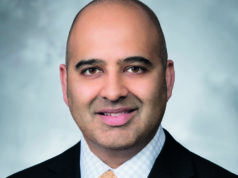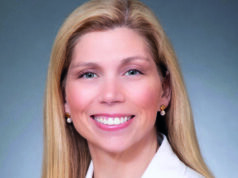
Daniel McDevitt, MD, spoke during the Community Practice Section at VAM 2024 on potential methods to participate in the shift to the office-based lab (OBL) and ambulatory surgical center (ASC). The president of Peachtree Vascular Specialists in Stockbridge, Georgia, shared his opinion that the OBL currently offers the highest reimbursement for the least investment and underscored the necessity of having a strong business plan ahead of making the move to any outpatient setting.
“We’re in challenging times right now,” McDevitt began, citing a continuing decrease in Centers for Medicare and Medicaid Services (CMS) reimbursement and limited time in the operating room and cath lab due to a “substantial reduction” in most hospitals’ workforce since COVID-19 as two of the main reasons behind this.
“The bottom line is, it’s much more difficult to make a living at the hospital,” McDevitt summarized.
In response to this, the presenter noted that many physicians have gone to employment. He went on to note, however, that positions are limited, and stressed that employed surgeons are often asked to do procedures that do not necessarily align with either their interests or their practice focus.
McDevitt went on to say that independent practice has always been “an escape pod for people [who] are tired of doing what other people have asked them to do” and offers more flexibility in terms of practice goals and lifestyles.
He noted that independent practice can be “financially challenging,” however, due to low reimbursement and escalating overhead costs.
McDevitt then moved on to the benefits and drawbacks of two alternatives: OBLs and ASCs.
With regard to OBLs, the presenter outlined three options: “the first is you can sublet table time or basically rent an OBL, you can purchase an existing OBL, or you can build your own.”
McDevitt noted that subletting an OBL offers an opportunity to “dip your toe in the water” and could provide “a reasonable return” for a relatively low investment.
Purchasing an existing OBL, “may be more realistic now” than it has been in the past due to the financial climate, McDevitt told the VAM audience. However, he stressed the importance of having a strong business plan to make it work.
“Don’t walk into these things without knowing what you’re doing, and always plan for a worse-case scenario,” he advised.
McDevitt then turned to the “most complex” option, which is starting an OBL from scratch.
“I will caution you, you do have to be financially able to withstand the start-up costs,” he said, adding that, “You should already be busy if you’re going to do this.”
In addition, McDevitt highlighted the fact that there would be state regulations to consider.
Moving on to ASCs, the presenter said that “usually the easiest way to go” would be to get staff privileges at an existing ASC.
“You won’t really derive any of the benefits of owning the facility,” he stressed, but emphasized that this option offers “more control over your time” and table access that might not be available at the hospital.
McDevitt said that buying an ASC is also an option but is one that represents “a pretty substantial financial risk” and warned again about having to “conquer” the regulatory side of things.
“Again,” he stressed, “a good business plan is mandatory.”
“In my opinion, the OBL is the highest reimbursement for the least investment right now,” McDevitt shared as his key conclusion. He continued: “Building your own OBL is doable, but buying an existing one may be more efficient for you.”
In terms of ASCs, McDevitt’s main take-home message was that these are “intriguing” for their higher reimbursement for some cases, but underscored the fact that they require a “substantial” investment and that the legal environment is “very challenging.”











